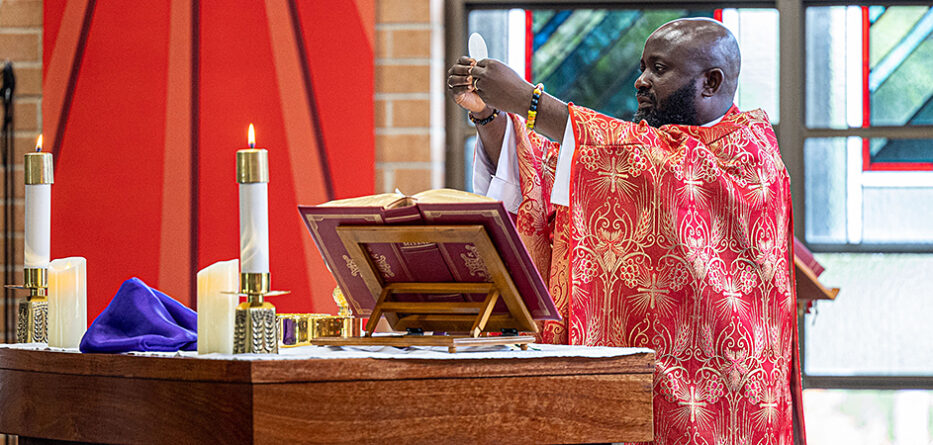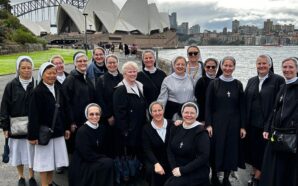Homily for the Solemnity of the Most Holy Body and Blood of Christ (Corpus Christi)
Readings: Deuteronomy 8:2-3. 14-16; Psalm 147:12-15, 19-20; 1 Corinthians 10:16-17; John 6:51-58
11 June 2023
In today’s first reading from Deuteronomy, Moses says to the people:
“Remember how the Lord your God led you for forty years in the wilderness, to humble you, to test you and know your inmost heart – whether you would keep his commandments or not. He humbled you, he made you feel hunger, he fed you with manna which neither you nor your fathers had known, to make you understand that we do not live on bread alone but that we live on everything that comes from the mouth of the Lord.
“Do not then forget the Lord your God who brought you out of the land of Egypt, out of the house of slavery: who guided you through this vast and dreadful wilderness, a land of fiery serpents, scorpions, thirst; who in this waterless place brought you water from the hardest rock; who in this wilderness fed you with manna that your fathers had not known.”
LISTEN: https://soundcloud.com/frank-brennan-6/homily-11623
These are very evocative words for those of us gathered on Palm Island this weekend for the funeral of community leader Thomas Geia. I made many trips to Palm Island 40 years ago when Tom was a young, emerging and resilient leader of his people. He never gave up, pursuing truth, justice and the wellbeing of his people.
Nowadays, there is a lot of talk about the need for an Aboriginal Voice. Tom was one of the first such voices from remote communities being heard on the national stage. I well remember 40 years ago, on 13 July 1982 to be precise. Two young Aboriginal leaders from Palm Island – Thomas Geia and Rachel Cummins – appeared on national television to correct the record, making it clear that the elected community leaders from Aboriginal communities around Queensland who had gathered at Bamaga on the tip of Cape York had not accepted the Bjelke-Petersen Government’s defective proposal for land tenure. Representing their people, they said they wanted more. They wanted secure land rights for their people. They were right when they said that the decision of the community leaders was a ‘slap in the face’ for the government because they who were calling for land rights and self-determination were not urban radicals but the elected leaders of their people. I was privileged to witness their sustained and reasoned stand for land rights when they were starved of resources, media interest and parliamentary access. It was their stand that effected real change. This was probably the first time ever that elected leaders from remote Aboriginal communities in Queensland had been heard on national television. And you have to remember that the Queensland government was all controlling of life on those remote communities back in those days. You needed a government permit to enter. And government determined who could have a house or a job. Though the Commonwealth had power to intervene since the 1967 referendum, no government of any political persuasion was prepared to take on the might of Joh Bjelke-Petersen.
Tom, Rachel and their fellow working party members then organised a meeting on Palm Island in August 1982. They published all their findings. And once more they appeared on national television in the lead up to the Commonwealth Games in Brisbane. Government ministers and government officials tried to silence and discredit them. But truth and justice were on their side.
Four years later, a secure land title was conferred on these communities. The new National Party Minister, a young Bob Katter, described the young turks who had appeared on television embarrassing the Bjelke Petersen government just four years before as ‘local heroes and martyrs’. I was privileged to join Bob and Rachel paying tribute to Tom at the funeral.
I recalled that on 31 October 1986 the land title at Palm Island was transferred at a ceremony at which Tom Geia spoke as chairman of the Palm Island Council. Tom told his people: “The first attempt by the people of Palm Island to have some control over their own affairs was in 1938 when the first council was formed.” Tracing the history of the struggle, including a famous strike in 1957, he listed people who had contributed to the struggle for land and human rights and said: “To all who have supported our quest for land rights and self management – this day belongs to you – you fought the good fight, not with violence, but with truth, until finally our aims were achieved.” He said: “It is to the credit of Mr Katter that he was able to arrange the process of development and finally the granting of the deeds of grant. My people, let us go from here united to develop our community into the paradise it should become, cutting away the legacy of our oppression. The land is ours – no one can take it away. Let’s use it to make a future for our children.”[1]
Last week, I was in Rome. I visited the Gesu Church where not only St Ignatius Loyola but also Pedro Arrupe lies buried. Arrupe was the superior general of the Jesuits after the Second Vatican Council. Having been in Hiroshima when the atomic bomb was dropped, he had a lifelong passion for justice and peace. He used to tell the story of celebrating mass at 5am the morning after the bomb was dropped. The Jesuit house was full of the walking wounded who were not Christian. They lay before him while he proclaimed Dominus vobiscum – the Lord be with you. By the time many of them had left the house weeks or months later, they had become Christian. They had been nurtured by the Eucharist. They had received the bread of life.
In 1976, Arrupe addressed the International Eucharistic Congress in Philadelphia on the theme ‘Eucharist and Hunger’. He said: “It is good to be with you and share with you this wonderful celebration”. He went on and asked the participants at the Congress who included many well-off Americans to “suppose the hungry of the world were also here with us this morning. Let us think only of those who are going to die of starvation today, the day of our Symposium of Hunger. There would be thousands of them, probably more than all of us who are gathered in this hall. Let us try to see them: their bodies weak and emaciated, their outstretched hands, their weak and fading voices, their terrible silence: ‘Give us bread … give us bread for we are dying of hunger!’”. Arrupe asked, “And if, at the end of our discussions on ‘the Eucharist and the Hunger for Bread,’ as we left the hall, we had to pick our way through this mass of dying bodies, how could we claim that our Eucharist is the Bread of Life? How could we pretend to be announcing and sharing with others the same Lord who said: ‘I come that they may have life, and have it more abundantly’?”[2]
He declared, “Yes, we are all responsible, all involved! In the Eucharist, Jesus becomes the voice of those who have no voice. He speaks for the powerless, the oppressed, the poor, the hungry. In fact, He takes their place. And if we close our ears to their cries, we are shutting out His voice too. If we refuse to help them, then our faith is indeed dead”.
He acknowledged that “the world we live in is full of injustice, hatred and violence. Everywhere we look we are confronted by what the Synod of Bishops described as: ‘a network of domination, oppression and abuses which stifle freedom and which keep the greater part of humanity from sharing in the building up and enjoyment of a more just and more fraternal world.’ Yet we have an answer which gives us hope and joy. It is the Eucharist, the symbol of Christ’s love for humanity. (Our task) is to share that love and translate it into effective action.”
Arrupe concluded: “Let us not forget that it is only when, in faith and love, we give away the little that we have—a few loaves and fishes—that God blesses our poor efforts and in His omnipotence multiplies them to meet the hunger of the world. Let us not forget that it was only after the widow had given Elijah some food, even from the little she possessed, that God came to her rescue. And Elijah was a complete stranger to her, from another country and worshiping a different God. In the same way, it was only in sharing their bread with a stranger that the two disciples on the road to Emmaus recognised and found the Lord.”
On this feast of Corpus Christi, let us feast on the bread of life, and let us share our bread with the hungry. Let us give thanks for those like Tom Geia and Rachel Cummins who stood up for their people. Happy are those who hunger for justice, they will be satisfied.
Come then, good shepherd, bread divine,
Still show to us thy mercy sign;
Oh, feed us still, still keep us thine;
So may we see thy glories shine
In fields of immortality;
O thou, the wisest, mightiest, best,
Our present food, our future rest,
Come, make us each thy chosen guest,
Co-heirs of thine, and comrades blest
With saints whose dwelling is with thee.
Fr Frank Brennan SJ is the Rector of Newman College, Melbourne, and the former CEO of Catholic Social Services Australia (CSSA).
[1] Frank Brennan, Land Rights Queensland Style, University of Queensland Press, 1992, pp. 70-1
[2] Pedro Arrupe, ‘Eucharist and Hunger’, 1976, available at https://jesuitportal.bc.edu/research/documents/1976_arrupeeucharist/








